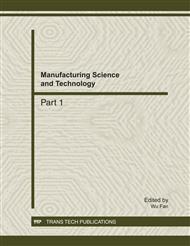[1]
Horowitz I.M., Survey of Quantitative feedback theory, International Joural of Control, vol. 53, no. 2, pp.255-291, (1991).
Google Scholar
[2]
Horowitz I.M., Optimum loop transfer function in single-loop minimum-phase feedback systems, Int. J. Control, vol. 18, no. 1, pp.97-113, (1973).
DOI: 10.1080/00207177308932490
Google Scholar
[3]
Horowitz, I.M., 1992, Quantitative Feedback Theory (QFT), QFT Publications, 4470 Grinnell Ave., Boulder, Colorado, 80303.
Google Scholar
[4]
Balance D.J., Gawthrop P.J. Control sytems design via a quantitative feedback theory approach, Proceedings of IEE Conference Control 91, pp.476-480, (1991).
Google Scholar
[5]
M. Tomizuka, Zero Phase Error Tracking Algorithm for Digital Control, ASME Journal of Dynamic Systems, Measurement, and Control, Vol. 109, pp.65-68, (1987).
DOI: 10.1115/1.3143822
Google Scholar
[6]
E. Torfs, et al, Comparison of Two Feedforward Design Methods Aiming at Accurate Trajectory Tracking of the End Point of a Flexible Robot Arm, IEEE Transactions on Control Systems Techonology, Vol. 6, pp.2-14, (1998).
DOI: 10.1109/87.654872
Google Scholar
[7]
B.K. Choi et al, A Feedforward Controller by Modified Series Approximation, IEEE Transactions on Mechatronics, Vol. 3, pp.249-251, (1998).
DOI: 10.1109/3516.712121
Google Scholar
[8]
S. S. Yeh, P. L. Hsu, An Optimal and Adaptive Design of the Feedforward Motion Controller, IEEE Transactions on Mechatronics, Vol. 4, pp.428-438, (1999).
DOI: 10.1109/3516.809521
Google Scholar
[9]
Liu Qiang, Er Lianjie, Digital Feedforward Control based on Pade Approximation, Jounral of Beihang University, vol. 8, pp.492-497, 2003. (in Chinese).
Google Scholar
[10]
Fu Qiang, Wu yunjie, QFT and ZPETC-Based Robust Control Design for a High-Accuracy Tracking System, Jounal of control theory and application, Vol. 23(8), pp.1-4, 2004. (in Chinese).
Google Scholar


